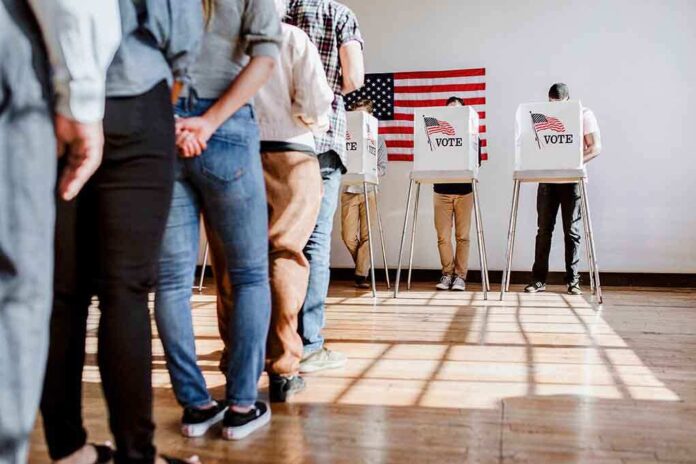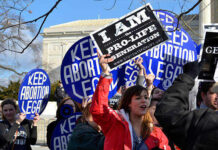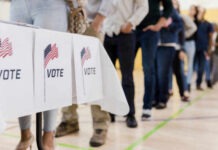
(TheConservativeTimes.org) – Every American citizen over the age of 18 has the right to vote in local, state, and federal elections. All you have to do is register—something that many states offer when you get your driver’s license. Every state makes its own rules and regulations regarding voter registration, but you can go to usvotefoundation.org to find the exact rules in your state.
Recent political misinformation has created a lot of confusion about voting rights. The fact that states all have different doesn’t make it any easier for voters to know their rights in their states, but there are some basic facts about voting that apply nationwide.
What are the rights of Americans at polling places?
Every American is assigned an exact place to go vote election day, That polling place is determined by your street address, and is usually located in a school, fire station, or other community facility near your home. Your name is only listed in the rolls at that location. Polling places change from time to time, but your local Board of Elections will let everyone know the new location.
It is your right to enter the polling place unmolested—meaning that campaigns and poll workers are not allowed to harass or intimidate voters on their way in or waiting in line. In most states, bystanders must keep a certain distance—50 feet or so—from the doors to the building.
What if my name is not on the roster?
There are several reasons your name may not be on the voter roster. If you missed the registration deadline, for example, or if you have moved and your precinct changed. Don’t assume it stayed the same, even if you are still in the same neighborhood. Ask the poll worker to double check your name, making sure they are spelling it right. There may be a supplemental voter list of late registrations or people who moved, check to see if your name is there. The poll worker can then call the local elections office to find out where you should be voting, or check a statewide database online (if one is available). You can also call 866-OUR-VOTE to help find you polling location.
If your name is not listed but you are registered, you are allowed to complete a provisional ballot at that polling place, or you may have to go to the Board of Elections. The provisional ballots are all forwarded to the central elections office in your county and are matched against the entire roster. If your name is in the wrong precinct, or you went to the wrong place, your vote is counted.
Will I need to show an ID?
Some states require voters to bring a government-issued—driver’s license, passport, or basic ID card—photo ID to vote. If you don’t have your ID and the poll worker asks to see it, ask to speak with the poll judge to confirm that request.
What if the voting machines break?
Voting machines are notorious for testing just fine and then malfunctioning on Election Day. The poll volunteers have paper ballots if this happens to you, so simply ask for one and complete it by hand. Those will be counted along with the machine ballots.
What happen if I’m in line when the polls are supposed to close?
Nothing—stay in line. Federal law requires polling locations to stay open and fully staffed until every voter (who is in line when the polls officially close) has had the chance to cast their ballot. If your polling location typically has long lines, you might want to vote during the Early Voting period when lines are usually a lot shorter.
Don’t let anybody tell you to go home—the polls stay open as long as you’re in line.
What should Americans do if they feel they are being discriminated against?
Federal law mandates that every American is allowed to vote, regardless of demographics or disability. It’s illegal for a precinct to ignore the Americans with Disabilities (ADA) Act and not provide access for disabled voters. If you’re a caregiver or helping an elderly parent vote, you are allowed in the voting booth to assist them. Wherever you vote, the local Elections Board must provide information and ballots in the languages common to the precinct, per the Voting Rights Act.
If you have any problems voting in the next election, call the Election Protection Hotline at these numbers.
- English: 1-866-OUR-VOTE, or 866-687-8683
- Spanish: 1-888-VE-Y-VOT, or 888-839-8682
- Arabic: 1-844-YALLA-US, or 844-925-5287
- Bengali, Cantonese, Hindi, Urdu, Korean, Mandarin, Tagalog, or Vietnamese: 888-274-8683
Every American should vote. Don’t let bad information keep you from exercising your most important citizen’s right.
Copyright 2023, TheConservativeTimes.org














